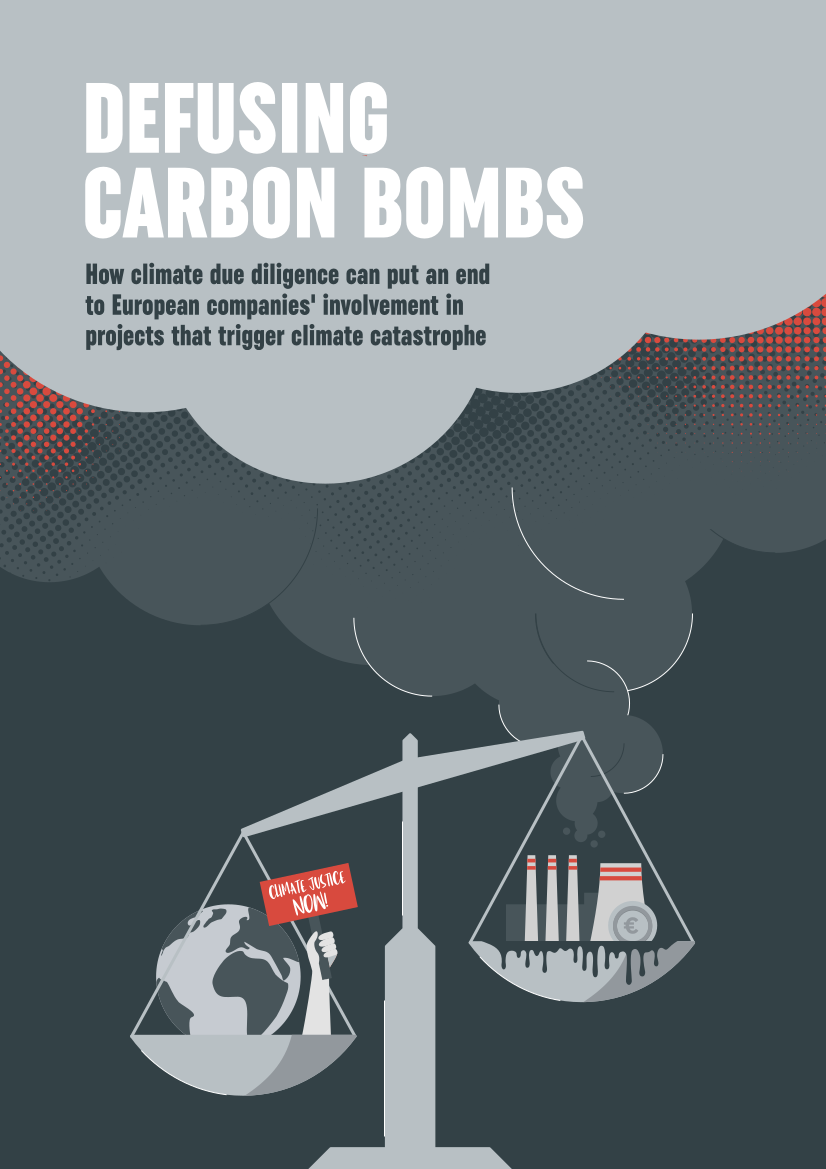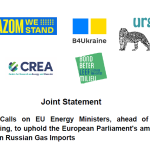Brussels, 7 November 2023 – A new report released today by a broad coalition of civil society organisations led by CAN Europe and Friends of the Earth Europe, reveals that at least 107 out of 425 of the world’s biggest fossil fuel extraction projects are operated by EU-based companies such as Total Energies, Shell, RWE, and ENI or financed by major European banks. The report sets out the case for legally binding climate reduction targets for companies and their enablers, the EU’s financial sector, in the EU due diligence law (CSDDD).
These fossil-fuel projects known as “Carbon Bombs” have profound climate-damaging impacts as the combined total projected emissions of these 107 EU-linked carbon bombs, once extracted and burned, amount to 333.9 gigatons of CO2 (GtCO2). That is 9 times the total emissions of the entire world in 2021, and 17 times the total emissions that the EU is allowed to until 2030.
The involvement of EU companies in these climate-destructive projects undermines the EU’s goal to reduce its greenhouse gas emissions by 55% by 2030, as a large part of this CO2 comes back to the EU as scope 3 emissions.
Audrey Changoe, Trade & Investment Policy Coordinator at Climate Action Network (CAN) Europe said: “The number and intensity of these gigantic fossil fuel projects is shocking and clearly shows that existing voluntary corporate commitments are insufficient. Fossil fuel companies are deceiving the public with their greenwashed strategies, while they keep making record profits on climate breakdown. Their destructive business model must be put to an end. In the absence of robust due diligence, a harrowing worst-case scenario continues, where social and environmental catastrophes go unchecked, particularly at the costs of the Global South.”
The Corporate Sustainability Due Diligence Directive has the potential to defuse these gigantic fossil fuel expansion projects and transform the way fossil fuel corporations conduct business. It marks a crucial step against corporate misconduct and fits into a larger legislative framework aiming to reach the EU’s 2050 climate neutrality goal. Legally binding CO2 reduction targets for companies would also significantly help EU member states with complying with their own climate reduction targets.
The directive has now entered high-stakes trilogue negotiations. The EU Parliament’s progressive stance on climate obligations – including a duty for large EU-based corporations to write and implement climate transition plans in line with the 1.5°C target – clashes with the Council’s intention to impose very little obligations and remove liability for contributing to the climate crisis.
Alban Grosdidier, Climate Campaigner at Friends of the Earth Europe said:
“Defusing carbon bombs should be a priority for climate change mitigation policies. The EU holds a pivotal role in preventing the development of new carbon bombs, by enforcing robust and legally binding climate obligations on companies operating within its market. France and Germany are pushing a position where companies would have to draft climate transition plans, but would be under no obligation to implement them; they’re simply championing a licence to greenwash.”
As world leaders discuss climate action at the COP28 at the end of November, big fossil fuel corporations and their financial backers are pushing the planet to a dangerous tipping point and threatening to shatter the internationally agreed 1.5C global warming limit, which experts have agreed is crucial to preventing catastrophic harm to the global population.
-ENDS-
For more information & interview requests, contact:
Jani Savolainen, Communication Coordinator
jani.savolainen@caneurope.org / +358 504667831
Notes to the Editor:
- Download the full report here.




